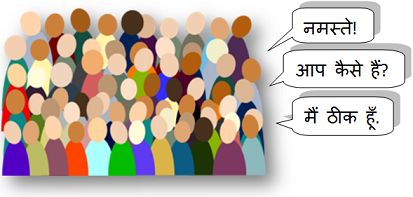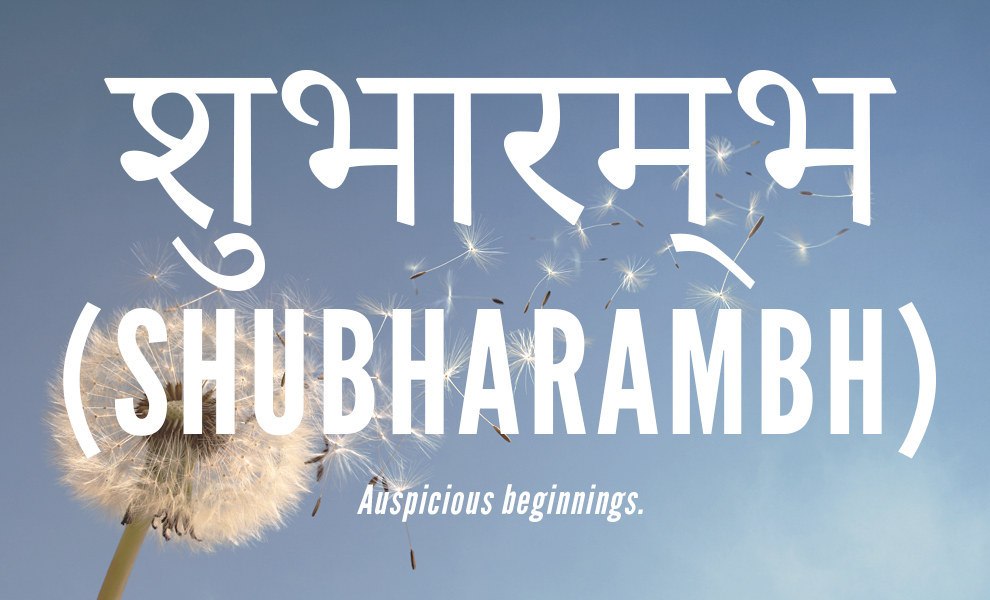
Past Habitual Tense & अपना
The past habitual tense in Hindi is very similar to the present habitual tense (see
Lesson 3). The only difference is that in present habitual tense, you add the present form of
होना to the end, while in the past habitual tense, you add the past form of
होना to the end. The table below conjugates the verb
जाना into past habitual tense.
|
Masculine |
Feminine |
| I used to go |
मैं जाता था |
मैं जाती थी |
| you used to go (informal) |
तू जाता था |
तू जाती थी |
| you used to go |
तुम जाते थे |
तुम जाती थी |
| you used to go (formal) |
आप जाते थे |
आप जाती थीं |
| he, she, it used to go |
वह जाता था |
वह जाती थी |
| we used to go |
हम जाते थे |
हम जाती थीं |
| they used to go |
वे जाते थे |
वे जाती थीं |
The Possessive Pronoun अपना
Possessive pronouns (sometimes called possessive adjectives) are words like
my –
मेरा,
your –
आपका, and
his –
उसका. In Hindi, when the subject of a sentence is also what is possessive of a different noun, a special possessive pronoun is used –
अपना. This possessive pronoun will follow the same inflection rules as the others you have learned.
I will give you my book. – मैं आपको अपनी किताब दूँगा।
She thinks about her brother a lot. – वह अपने भाई के बारे में बहुत सोचती है।
Give me your pen. – मुझे अपना क़लम दो।
Vocabulary
| every day |
रोज़ |
|
to live, to remain, to stay |
रहना |
| park |
पार्क |
|
|
|
Examples
I used to go to the store every day.
मैं रोज़ दुकान जाता था।
She used to want to live in India.
वह भारत में रहना चाहती थी।
I used to play in that park.
मैं उस पार्क में खेलता था।
Tell me your name.
मुझे अपना नाम बताइये।
Eat your own food.
अपना खाना खाइये।
Past Imperfect Tense with Transitive Verbs
Transitive & Intransitive Verbs
A transitive verb is a verb that can take an object, such as give, eat, or do.
I gave him
money.
I ate
food.
He did
work.
Intransitive verbs (discussed in the next lesson) include go, come, and die. These verbs cannot have an object: he went food, or I came money.
Past Imperfect Tense
The past imperfect and past perfect tenses for transitive verbs are quite different from all the other tenses in Hindi. To form a past imperfect transitive verb, you must first add the postposition
ने to the subject. Keep in mind that the subject will inflect, if possible. Then we will modify the verb. If the verb stem ends in a consonant, we will add
आ if the direct object is masculine singular,
ई if the direct object is feminine singular,
ए if the direct object is masculine plural, and
ईं if it is feminine plural. Now if the verb stem ends in a vowel, add
या if the direct object is masculine singular,
ई if the direct object is feminine singular,
ए if it is masculine plural, and
ईं if feminine plural. You should notice that in the past imperfect (and past perfect) tense, the verb agrees in gender with the direct object rather than the subject.
Irregular Verbs
There are four irregular verbs we need to consider:
देना,
लेना,
करना, and
पीना. These four verbs will all follow the same pattern.
masculine singular object:
दिया लिया किया पिया
masculine plural object:
दिये लिये किये पिये
feminine singular object:
दी ली की पी
feminine plural object:
दीं लीं कीं पीं
Examples
I gave him a book.
मैं ने उसको किताब दी।
She ate food.
उसने खाना खाया।
Did you (do) work today?
क्या आप ने आज काम किया?
I drank tea today.
आज मैं ने चाय पी।
He took my book.
उसने मेरी किताब ली।
When did you read her book?
आप ने उसकी किताब कब पढ़ी?
My father told me this.
मेरे पिता ने मुझे यह बताया।]]>

 मंगलवार (mangalvaar) – Tuesday
बुधवार (buudhvaar) – Wednesday
गुरुवार (guuruuvaar) – Thursday
शुक्रवार (shuukravaar) – Friday
शनिवार (shanivaar) शनीचर (sanichar) – Saturday
मंगलवार (mangalvaar) – Tuesday
बुधवार (buudhvaar) – Wednesday
गुरुवार (guuruuvaar) – Thursday
शुक्रवार (shuukravaar) – Friday
शनिवार (shanivaar) शनीचर (sanichar) – Saturday

 11 — ग्यारह GYAARAH
12 — बारह BAARAH
13 — तेरह TERAH
14 — चौदह CHAUDAH
15 — पन्द्रह PANDRAH
16 — सोलह SOLAH
17 — सत्रह SATRAH
18 — अठारह ATHAARAH
19 — उन्नीस UNNEES
20 — बीस BEES
11 — ग्यारह GYAARAH
12 — बारह BAARAH
13 — तेरह TERAH
14 — चौदह CHAUDAH
15 — पन्द्रह PANDRAH
16 — सोलह SOLAH
17 — सत्रह SATRAH
18 — अठारह ATHAARAH
19 — उन्नीस UNNEES
20 — बीस BEES
 सितम्बर (sitambar) – September
अक्तूबर (aktubar) – October
नवम्बर (navambar) – November
दिसम्बर (disambar) – December
सितम्बर (sitambar) – September
अक्तूबर (aktubar) – October
नवम्बर (navambar) – November
दिसम्बर (disambar) – December
 Where? – कहाँ (kahaan)
How many? – कितने (kitne)
Whose? – किसका (kiskaa)
How much? – कितना (kitnaa)
Where? – कहाँ (kahaan)
How many? – कितने (kitne)
Whose? – किसका (kiskaa)
How much? – कितना (kitnaa)

























